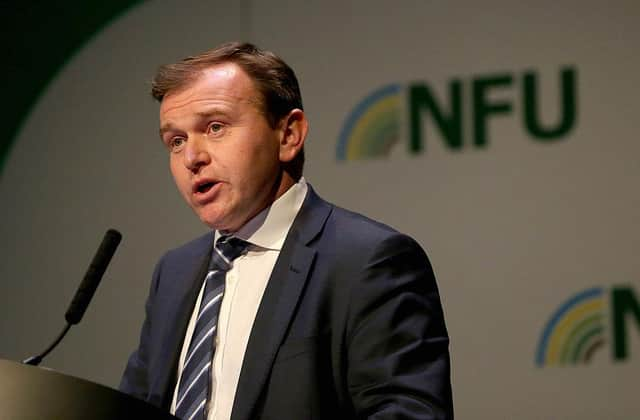Brian Henderson: Are Scots farmers going to be hobbled?


The phrase came to mind during last week’s NFU Scotland annual general meeting. This might not be all that uncommon a thought under normal circumstances – when the “morning after the night before”, post-big dinner revelry highlights those who had been trying to relive their Young Farmer days, But the online format imposed on the event in these strictured times should have precluded that excuse. No, this portentous thought was actually brought to mind by English NFU president Minette Batters when she joined the panel session involving the presidents of the UK’s four farming unions. To be clear, though, it was no reflection on the engaging Ms Batters herself – but rather a thought driven by something she said.
For, while much of the frustration expressed at the meeting by Scotland’s farmers revolved around the lack of any clear details on future policy, Batters, who stated flatly that she’d far rather be negotiating the future of farming with Scotland’s rural economy secretary Fergus Ewing than with Defra Secretary of State George Eustice, revealed that it was the emerging detail in England which was the greatest source of angst. For, in stark contrast to the slow and cautious approach of Mr Ewing – with his five farmer groups set up to act as midwives to the new policy – the wholly radical and speedy move away from the EU’s Common Agricultural Policy and sidelining of food production for environmental goals marks a game changer in support measures in England. And Batters said the fast-paced change in direction could mean a 60-80 per cent drop in average farm incomes south of the Border over a period of only a few years.
Advertisement
Hide AdAdvertisement
Hide AdBut, with a general agreement that while the pace of change and the methodology of delivery was likely to be different in all four regions of the UK, the landing space was likely to be the same in the long run. And it was Batter’s advice to Scottish farmers to watch closely what happened in England and prepare for a similar fate which prompted the graveyard’s “so you will be” chain of thought. So, if Scotland deserves the prize for the most constructive approach to farm policy, was anything new unveiled in the cabinet secretary’s traditional annual address to the meeting? Not a lot. Yet there were some hints.
Support for food production would continue beyond 2024 – but with green strings attached. And an indication was given that some of the route map could be clearer within the next month – with the blueprint for the suckler beef pilot scheme likely to be revealed before the introduction of purdah for the Scottish elections at the end of March. A nationwide effort to gather information on carbon audits, soil quality and nutrient plans was also indicated, to draw up a baseline which would assess progress as pilots and schemes developed. And while the current support system will continue pretty much as is until 2024, Ewing said that although major changes in the delivery mechanisms would begin to be transitioned in by that point, an element of income support was likely to continue beyond that date: “With approximately 2/3rds of farm businesses making a loss without access to support payments, to precipitously withdraw that element, as is being done elsewhere, could risk obliterating farming, especially in our hills and islands.”
But he didn’t exactly quell fears that with high input, low margin enterprises on the better region, one land might be less well looked after, stating: “All farmers deserve financial support – but some are in more need than others.” More financially successful businesses, he said, could benefit through capital grants designed to enhance and encourage productivity: “But plainly those who farm in our most challenging lands have a greater justification for access to such support.” Let’s hope that doesn’t lead to a region "one foot in the grave".